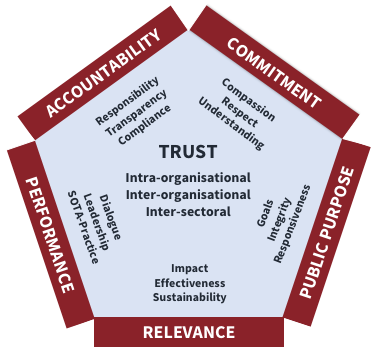Philanthropy.Insight
As public distrust is sweeping the globe, trust has become a central resource for civil society, and especially philanthropy. Against this backdrop, the Philanthropy.Insight project proposes five principals along which philanthropies are able to align their practice towards a more trust-driven approach. In particular, the project concentrates on developing the modalities of a philanthropic concept of trust, and studies how self-assessments beyond fixed indicators might contribute to strengthen trust and demonstrate responsibility of future philanthropic practice. The Philanthropy.Insight project is organized by the Tocqueville Forum of the Maecenata Foundation and receives support from the Carnegie UK Trust and the Fundação Calouste Gulbenkian.
Why trust matters
Trust is a critical asset in navigating change. Many institutions, including philanthropic organizations are recognizing the relevance of trust for their operations – and not just since the onset of the COVID_19 pandemic. But how to advance trust in practical terms? Based on the concept of trust-driven philanthropy developed by the Philanthropy.Insight project, a group of like-minded partners of the philanthropic community will explore experiences and good practices to build a self-assessment tool. Ultimately, standards of trust driven philanthropy could emerge, providing guidance to all philanthropic actors in building trust for strong and impactful philanthropy.
A pentagon of five overarching principles has been identified by the Philanthropy.Insight project to be at the core of trust-driven philanthropy: Trust influences personal and institutional relations; as an authentic, honest intention and a willingness to be vulnerable on the one hand, and reliance on competence and skills on the other. The Philanthropy.Insight (PI) principles have been turned into an assessment tool (PIAT) by breaking down the principles into qualities and introducing a questionnaire.
Philanthropy.Insight Assessement Tool

The Philanthropy.Insight Assessment Tool (PIAT) is to be understood as a systemic attempt to generate the essential principles of a trust-driven philanthropy and its working practices. Each principle is broken down into three qualities. The order in which the principles are presented reflects a judgment with regard to their contribution to a trust-driven approach. Furthermore, the qualities come with questions for each thought to provide a starting proposition for the discussion. PIAT acknowledges that there are three dimensions of trust that have to be taken into account: Trust within and between philanthropic organizations and vis-a-vis the public and private sector, but also against increasing public scrutiny. Commitment, Public Purpose and Relevance represent the emotional side of trust which lie to some extent beyond quantitatively assessable control. Performance and Accountability take a more practical side of trust into consideration. >> More information
Next Steps
We seek to build a shared and open platform in which decision-makers, experts and multiplicators of the philanthropic eco-system come together to distill experiences and good practices of trust-driven philanthropy PIAT is proposed to be the starting point of this joint learning process in an environment of confidentiality.
Publications
- Measuring the Impact of Philanthropy – Why it matters and how it can be improved. (2022)
Rolf Alter and Timo Unger
Demonstrating impact is typically meant to be a sign of efficiency, effectiveness, transparency, and legitimacy of those who take action. True in business and government, philanthropy and in many ways civil society more generally are increasingly feeling the pressure to deliver and document impact. In fact, how philanthropy is performed and to which extent activities of philanthropic foundations are resulting in measurable impact seems increasingly to overtake doing good as the underlying driver of engagement. Whereas proponents are adducing increased accountability, more critical voices argue that philanthropic foundations should first invest in clarifying the approaches to measurement: what are the objectives of their engagement, what are appropriate indicators and which data capture these dimensions. Against the backdrop of this controversial debate, this article seeks to centre around the question why measuring impact is a challenging, but valuable practice for philanthropic foundations and to derive propositions for potential improvement.
- Addressing Wicked Problems. Collaboration, Trust and the Role of Shared Principles at the Philanthropy Government Interface. (2021)
Rolf Alter, Rupert Graf Strachwitz and Timo Unger
Despite their promising potential, collaborative activities with governments difficult to achieve. However, operationalizing trust in its emotional and practical form is seen as a central driver of collaborations across all sectors. By adopting performance management systems that include a broad understanding of performance beyond fixed indicators, it is argued that philanthropies are able to operationalize the resource trust. The Philanthropy.Insight Assessment Tool is proposed as an example of a trust-driven performance management system.
>> More information
- The Means at hand. Trust-driven practice strengthens the values-base of philanthropic organisations. DAFNE – Donors and Foundation Networks in Europe (2021)
Timo Unger
Recently, Beth Breeze remarked that – what she called – the “philanthropic impulse” needs to be safeguarded against increasing criticism. Breeze announced she will be taking care of articulating and defending the values of philanthropy in her upcoming book. We can only applaud this approach, but would also emphasise the fundamental contribution of trust-driven practice that the Philanthropy.Insight Assessment Tool (PIAT) proposed by the Maecenata Foundation brings to the table. While philanthropic organisations often exhibit quite a diverse range of values, they show only minor effort in institutionalising relevant practices. This paper argues that philanthropic organisations already have the means at hand to articulate and defend themselves and their values – by building and extending trust in their practice.
>> More information
- A multidimensional concept of trust for philanthropic organizations: Propositions in light of the SDGs. (2021)
Rolf Alter and Timo Unger
Three dimensions of trust are identified to be relevant for philanthropies when promoting the SDGs. First, intra-organizational trust, meaning trusted organizational environments inside philanthropic organizations. Second, inter-organizational trust, associated with strengthening the relationships between actors of the philanthropic eco-system. Third, Intersectoral trust, i.e. that philanthropies establish themselves as epistemic community vis-a-vis the public and private sector, but also against increasing public scrutiny.
>> More information
- Vertrauen in der Praxis der Philanthropie. Dimensionen, Prinzipien und Erfahrungsaustausch als Lernprozess. (2021)
Rolf Alter and Timo Unger
>> More information
- What Space for Philanthropy in Covid-19 Times? (2021)
Rolf Alter and Timo Unger
During Covid_19, the demand for philanthropy among grantee groups is rising steeply whereas endowments will not remain unaffected by the ensueing economic crisis. Thus, a coherent strategy for philanthropy cum and post the pandemic needs to be directed at the current mismatch of demand and supply and ongoing measures alike. On the basis of three focal points – public utility, dialogue, and trust – a joint learning process among leading actors of philanthropy is proposed to initiate a shared strategy for future philanthropy being conducive to open, fair and inclusive societies.
>> More information
- Improving Trust in Trusts: Introducing the Philanthropy.Insight Tool (2020)
Rolf Alter und Rupert Graf Strachwitz
Given a general tendency to mistrust larger institutions and increasing queries regarding the legitimacy of private trusts and foundations in modern democratic societies, new tools need to be developed in order to be able to fend off criticism. Concentrating on outcomes and impact alone is arguably not sufficient. This article introduces Philanthropy.Insight, a new and more comprehensive tool by which the work of trusts and foundations may be better assessed
>> More information
- Philanthropy.Insight – Work in Progress (2019)
Rolf Alter, Rupert Graf Strachwitz and Timo Unger
Disruptive dynamics of globalization, the technological revolution, and the crisis of democracy proliferate changes within society, including philanthropy. Trust is one of the major casualties, with negative consequences for social cohesion, democracy, and the markets. Philanthropy.Insight aims at building trust by a stronger, better defined and more accountable role of philanthropy within civil society. It offers a pentagon of principles as a starting proposition.
>> More information
- Building trust in the intentions of philanthropy: How the creation of self-determined standards might reconcile the accountability deficit of philanthropic practice. (Pending)
Rolf Alter and Timo Unger
In light of Covid-19, trust in philanthropies has substantially decreased. Against this backdrop, this article seeks to illuminate on the underlying reasons for this development. Whereas several reasons are to be found, lacking accountability mechanisms are identified as major obstacles to building trust in the intentions of philanthropy. Derived from this insight, three scenarios are sketched to showcase in which way accountability mechanisms can be imposed on philanthropies. They range from lobbying for public regulation, to following a business-like code of conduct, and to creating a joint standard among well-reputed philanthropies. In a last part, authentic selfassessments, as proposed by the Philanthropy.Insight Assessment Tool, are suggested as an encouraging
way forward to reflect on the modalities of self-determined standards. Reasons include that they comprise the most promising potential to hold philanthropies accountable while likewise respecting their self-understanding as independent actors.







